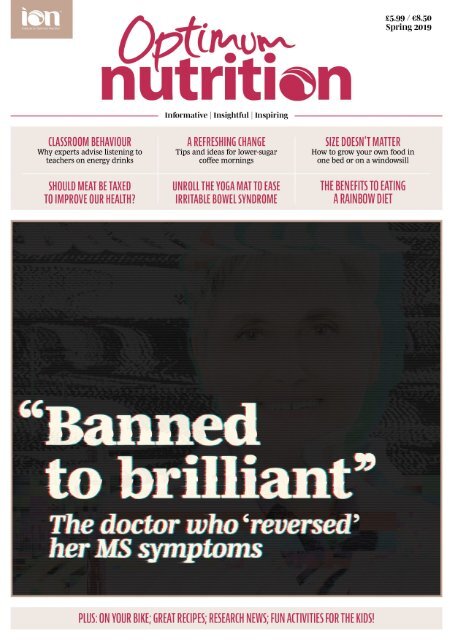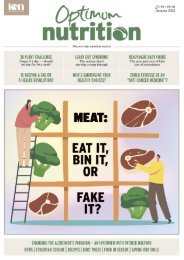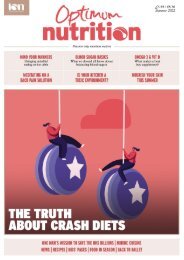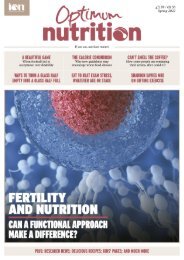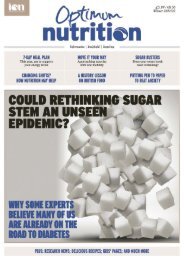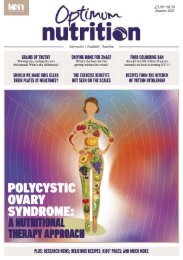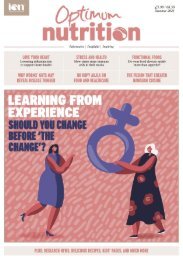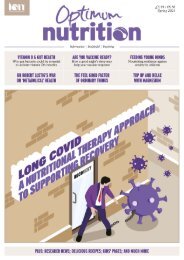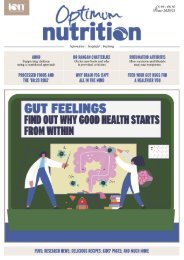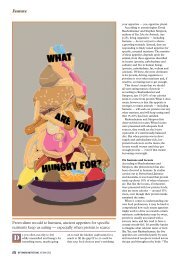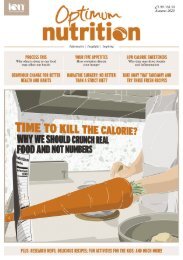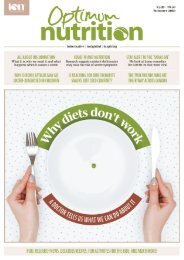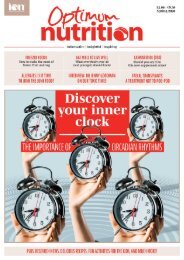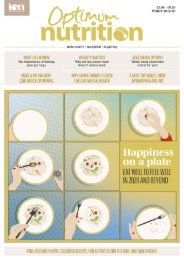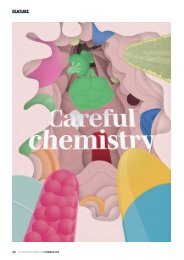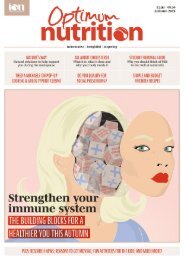You also want an ePaper? Increase the reach of your titles
YUMPU automatically turns print PDFs into web optimized ePapers that Google loves.
THIS ISSUE<br />
20<br />
“Banned to brilliant”<br />
Physician, researcher and author Dr Terry Wahls talks about multiple sclerosis, research projects, criticism and praise<br />
08<br />
A taxing problem<br />
Last year, proposals were made for a UK<br />
tax on red and processed meat. Alice Ball<br />
finds out how raising prices may benefit<br />
human health and the environment<br />
18 One bed for veg<br />
We don’t always need lots of space to<br />
grow food at home. Find out how one<br />
raised bed is all you need, and how to<br />
grow food from scraps on a windowsill<br />
10<br />
Cake sales are a great way to support<br />
charities, but experts have suggested they<br />
encourage unhealthy eating. We look at<br />
some alternative ideas<br />
23<br />
Coffee and cake?<br />
Little lives<br />
Are free fruit and vegetables turning<br />
children off healthy food? Amelia Glean<br />
writes; and Catherine Morgan says why<br />
we need to switch off to reconnect (p.28)<br />
14<br />
On your plate<br />
Recipes from Dr Rupy Aujla’s new book<br />
The Doctor’s Kitchen — Eat to Beat Illness;<br />
demonstrating that food for health and<br />
wellbeing can look and taste fantastic!<br />
30<br />
World cuisine<br />
How traders and soldiers from Asia,<br />
colonisers from Europe and America, and<br />
a global diaspora have contributed to the<br />
rich history of food from The Philippines<br />
32 Research update<br />
A look at polyunsaturated fatty acids<br />
omega-3 and omega-6, and why the<br />
western diet, which is typically low in<br />
omega-3, may need to deliver more<br />
44<br />
All about<br />
Researchers have said there is insufficient<br />
evidence to legislate against the sale of<br />
energy drinks to children, but have invited<br />
voluntary action. James Billot writes<br />
Contents<br />
34 Different strokes<br />
Research shows that yoga may ease<br />
digestive problems and IBS. We speak to<br />
registered nutritional therapist and yoga<br />
instructor Charlotte Watts<br />
46 Move it 50<br />
UK bike week is set for 8-16 June so<br />
Graeme Wilcockson gives a brief history of<br />
the bicycle and sets out some tips on how<br />
to get started with your own set of wheels<br />
40 Food fact file<br />
What are the benefits of a rainbow diet?<br />
Lisa Patient looks at plus points behind<br />
the colours, and we feature rainbow<br />
recipes to inspire you this spring<br />
Graduate story<br />
Belinda Blake tells us how she progressed<br />
from studying nutrition at ION to teaching<br />
it, and why she thinks that nutrition<br />
should be taught in schools, too<br />
04 Comment / news | 26 Kids’ pages | 29 Book therapy<br />
36 Product news | 38 Kitchen chemistry | 39 In season<br />
SPRING <strong>2019</strong> | OPTIMUM NUTRITION<br />
3
ON YOUR PLATE<br />
Dr Rupy Aujla was an NHS GP when he started his blog The Doctor’s Kitchen to inspire people to eat for better health. As a clinical<br />
advisor to the Royal College of GPs, he is passionate about bringing the concept of ‘culinary medicine’ to the medical profession<br />
worldwide. We feature three simple and delicious recipes from his new book The Doctor’s Kitchen — Eat to Beat Illness<br />
Sweet Cajun salmon<br />
“Salmon is a fantastic oily fish that<br />
contains essential fatty acids to support<br />
brain and heart health. Combined with<br />
quinoa, watercress and sweetcorn, it’s a<br />
delicious satisfying meal. The hot Cajun<br />
spices contrast well with a small amount<br />
of sweetness from dark sugar.”<br />
Serves: 2<br />
Ingredients<br />
• 2 x 200 g salmon fillets (preferably<br />
wild, line-caught)<br />
• 200 g quinoa<br />
• 500 ml water<br />
• 1 tsp sweet paprika<br />
• 150 g sweetcorn, sliced off the cob (or<br />
frozen kernels)<br />
• Sea salt and freshly ground black<br />
pepper<br />
• 150 g watercress, roughly chopped<br />
For the Cajun marinade:<br />
• 2 tbsp milled flaxseed (or wholemeal<br />
breadcrumbs will work)<br />
• 2 tsp Cajun spice blend<br />
• Grated zest and juice of 1 lime<br />
• 1 tsp brown sugar or coconut sugar<br />
• 2 tbsp coconut oil, melted<br />
Method<br />
Mix the marinade ingredients together in<br />
a bowl. Add the salmon fillets and leave to<br />
marinate for 20 mins. While the salmon<br />
is marinating, soak the quinoa in a bowl of<br />
water for the same amount of time.<br />
Add the quinoa to a dry saucepan over<br />
a medium heat and toast the grains for<br />
a few mins. Boil the 500 ml water then<br />
add it to the pan of quinoa along with the<br />
paprika, sweetcorn and some salt and<br />
pepper. Simmer for 15 mins then plate up<br />
with the watercress.<br />
Heat a frying pan over a medium-low<br />
heat and place the marinated fillets in<br />
the pan skin side down, pressing them<br />
gently for the first 30 secs. Cook for about<br />
6 mins until the top side begins to turn<br />
opaque, then flip the fillets over and cook<br />
on the other side for a further 3-4 mins<br />
until cooked through.<br />
Place the salmon on top of the quinoa<br />
and watercress and enjoy.<br />
14 OPTIMUM NUTRITION | SPRING <strong>2019</strong>
INTERVIEW<br />
When Dr Terry Wahls developed her protocol for multiple sclerosis (MS), a disease that causes<br />
signalling problems in the nervous system, one organisation initially banned her as a speaker for<br />
offering false hope. Now the same organisation is funding her research. Louise Wates writes<br />
20 OPTIMUM NUTRITION | SPRING <strong>2019</strong>
INTERVIEW<br />
I<br />
n 2014, a book called The Wahls<br />
Protocol: How I Beat Progressive<br />
MS Using Paleo Principles<br />
and Functional Medicine landed on the<br />
<strong>Optimum</strong> <strong>Nutrition</strong> desk. Inside, Dr Terry<br />
Wahls, a clinical professor of medicine<br />
at the University of Iowa, USA, described<br />
how dietary changes reversed her MS<br />
symptoms. A bold claim indeed. Although<br />
there is a great deal of research into MS,<br />
treatments have typically focused on<br />
medical intervention with recent studies<br />
even looking at drastic treatment to knock<br />
out and reboot the immune system. A<br />
dietary and lifestyle protocol was nothing<br />
new, however; both the Swank Diet and<br />
the Jelinek Overcoming Multiple Sclerosis<br />
programme already existed. Yet in Wahls’<br />
book there was something that seemed<br />
almost miraculous about her recovery. At<br />
her worst, she was in a wheelchair. Now<br />
she cycles every day.<br />
Yet despite Wahls’ seemingly fantastic<br />
recovery, it proved difficult to get<br />
somebody with MS to read the book<br />
— such a viewpoint would have been<br />
valuable. But in the words of one contact<br />
who had lived with MS for 30 years,<br />
she felt as though she had already tried<br />
“everything” and didn’t believe Wahls had<br />
anything new to say. Eventually we found<br />
a young woman with a recent diagnosis<br />
who was interested. She concluded that<br />
it wasn’t just a book for MS sufferers; it<br />
was a book for everyone. But she was not<br />
prepared to put Wahls’ protocol in place —<br />
yet. The thought of giving up grains, pasta<br />
and potatoes was so unappealing she<br />
would rather wait until her symptoms had<br />
worsened.<br />
When, by email, I ask Wahls to<br />
comment on this response to her book she<br />
is unsurprised. “Not everyone is ready,”<br />
she says. “People [are] at varying stages<br />
of interest in trying a therapeutic lifestyle.<br />
Think of how many people are addicted<br />
to tobacco, alcohol and will die earlier as<br />
a result of their addiction. They know the<br />
harms caused by their addiction, but they<br />
are unable to stop.”<br />
She acknowledges that lifestyle changes<br />
are not always easy — her followers have<br />
been dubbed “Wahls’ warriors”, she<br />
explains, because what they do is not easy.<br />
“They implement a therapeutic lifestyle<br />
giving up sugar, processed foods [and]<br />
sedentary habits, and sustain new<br />
nutrient-dense diets and lifestyle habits,”<br />
she says. “Sustaining a therapeutic diet is<br />
very challenging — that is what behaviour<br />
scientists will tell you.<br />
“If it was easy, we would not have an<br />
epidemic of chronic disease.”<br />
Some who find it hard to change<br />
behaviours, she says, may have “learned<br />
helplessness” and might benefit from<br />
cognitive behaviour therapy to help them<br />
— if they wanted to change.<br />
And for anyone used to a standard<br />
western diet high in carbohydrates and<br />
processed foods, the Wahls protocol is<br />
not an easy option. There are different<br />
levels to follow; at its strictest — the level<br />
she herself follows — it involves staying in<br />
ketosis; so eliminating sugar and starchy<br />
carbs. At its very basic level, it involves<br />
eliminating gluten, dairy and eggs, and<br />
incorporating a wide range of vegetables<br />
and fruit, meat and organ meats.<br />
For Wahls, this is now her way of life.<br />
After being diagnosed in 2000 with<br />
relapsing remitting MS, and in 2003 with<br />
secondary progressive MS, conventional<br />
treatment was not enough. She underwent<br />
chemotherapy in an attempt to slow down<br />
the disease but was eventually forced to<br />
use a tilt-recline wheelchair, to which she<br />
was confined for four years. She believes<br />
that she had been facing the prospect of<br />
being bedridden.<br />
According to the Multiple Sclerosis<br />
Trust in the UK, an estimated 2.5 million<br />
worldwide have the condition. Affecting<br />
the myelin sheath (protective covers) of<br />
nerve cells in the spinal cord and brain, MS<br />
leads to signalling problems in the nervous<br />
system, causing a range of symptoms<br />
that often lead to disability. Relapsingremitting<br />
MS is the most common form,<br />
characterised by attacks during which<br />
symptoms worsen or new symptoms<br />
appear. Another form is primary<br />
progressive MS, which is characterised<br />
by slow onset and steadily worsening<br />
symptoms. Because MS is considered to<br />
be a degenerative disease for which there<br />
is no cure, Wahls’ book was startling in its<br />
claims — although she does not claim to<br />
have been cured of all illness. Her website<br />
says: “I am... a patient with a chronic,<br />
progressive disease.”<br />
So, whilst she keeps busy with her work,<br />
she says she is committed to taking care<br />
of herself.<br />
Research<br />
It was the question of how to take care<br />
of herself that led Wahls to search for<br />
ways to manage her condition. Just as<br />
any of us might turn to books, journals<br />
or the internet to cope with illness,<br />
Wahls immersed herself in the latest<br />
...one of the biggest changes for Wahls, however, was — as a<br />
vegetarian — incorporating meat and organ meats into her diet<br />
research; relearning biochemistry, cellular<br />
physiology and neuroimmunology to make<br />
sense of what she was reading. Yet she<br />
knew that what goes on in laboratories can<br />
take decades to impact human medicine,<br />
so began taking supplements of nutrients<br />
associated with brain health. But although<br />
her physical decline slowed down, it did<br />
not stop.<br />
Dietary changes<br />
Gradually, Wahls’ diet radically changed.<br />
Many ordinary foods such as bread,<br />
sugar, pasta and potatoes were dropped,<br />
and a range of vegetables added in. Her<br />
protocol excludes gluten, dairy and eggs.<br />
Foods known as nightshades, which<br />
include peppers, chillies, tomatoes and<br />
aubergines, are also excluded for people<br />
with rheumatoid arthritis or who haven’t<br />
responded to the initial levels of the<br />
protocol.<br />
Perhaps one of the biggest changes for<br />
Wahls, however, was — as a vegetarian<br />
— incorporating meat and organ meats<br />
into her diet. Having grown up on a farm in<br />
Iowa, she had given up meat because she<br />
believed that it was wrong to farm animals<br />
for food and that it was environmentally<br />
unsustainable. But after reading the work<br />
of Dr Ashton Embry who recommended<br />
a diet that included meat but excluded<br />
grain and dairy, she considered it for<br />
herself. It was not an easy decision. “It<br />
took a great deal of prayer, meditation, and<br />
a gradual process,” she says. In her blog<br />
she describes adding meat to soups, after<br />
which she began to feel stronger. Now,<br />
although her diet is commonly described<br />
as ‘paleo’, it is not focused on meat as that<br />
label seems to imply. Emphasis is given to<br />
a range of vegetables and fruit each day,<br />
with small amounts of good-quality meat.<br />
Whilst what works for one person<br />
may not work for another, evidence<br />
supporting Wahls’ protocol is based on<br />
subsequent research and results from<br />
SPRING <strong>2019</strong> | OPTIMUM NUTRITION<br />
21
ALL ABOUT<br />
Study authors have found insufficient evidence to make it illegal to sell energy drinks to<br />
children, yet would welcome voluntary action including exclusion zones. James Billot writes<br />
D<br />
espite several supermarkets<br />
imposing their own bans<br />
on selling energy drinks to<br />
under-16s, the Science and Technology<br />
Committee’s Energy Drinks and Children<br />
Report, published in December last year,<br />
concluded that there wasn’t enough<br />
“quantitative evidence” to warrant making<br />
their sale to children illegal, potentially<br />
halting any government plans for<br />
legislation.<br />
The report advised that it was currently<br />
unclear whether energy drinks were<br />
more harmful than other soft drinks.<br />
Yet, despite this, it welcomed any<br />
voluntary action — including exclusion<br />
zones — taken by schools, retailers and<br />
local communities that could reduce the<br />
consumption of energy drinks by children.<br />
It also recognised that despite its main<br />
findings, that “it might be legitimate” for<br />
the experiences of teachers and other<br />
groups (“qualitative evidence”) to lead to<br />
a statutory ban. 1<br />
As a result, the government faces the<br />
decision as to whether it should act now,<br />
or wait for further evidence.<br />
According to the report, children in<br />
the UK are the largest consumers of<br />
energy drinks in Europe. Between 2012<br />
and 2017, the market ballooned by 19<br />
per cent and globally it is predicted by<br />
business analysts to increase by 3.7 per<br />
cent year-on-year over the next five years.<br />
But in spite of this rise, there has been<br />
no long-term research into the effects of<br />
energy drinks. Although warnings have<br />
come from sources such as the European<br />
Food Safety Authority (EFSA) and the<br />
World Health Organization (WHO), so<br />
far only one country in the EU, Lithuania,<br />
has banned the sale of energy drinks to<br />
minors.<br />
Main issues<br />
The NHS defines energy drinks as soft<br />
drinks with high levels of caffeine, taurine<br />
(an amino acid) and vitamins. They also<br />
contain high levels of sugar: while a 330<br />
ml can of Coca-Cola has 32 mg of caffeine<br />
and 35 g of sugar per can, a 473 ml can<br />
of Red Bull has 151 mg of caffeine and<br />
52 g of sugar. However, it is their high<br />
caffeine content that the NHS, EFSA and<br />
WHO links to a number of health and<br />
behavioural problems.<br />
“The main issues are the level of<br />
sleep deprivation, hyperactivity and bad<br />
behaviour in the classroom,” says Kawther<br />
Hunt, a registered nutritionist at charity<br />
group Action on Sugar. “But there is also<br />
a link between risky behaviour and energy<br />
drink consumption, which can include<br />
under-age alcohol consumption and drug<br />
use.”<br />
Whilst risky behaviour in children such<br />
as drinking alcohol and smoking was<br />
found by the committee to be associated<br />
with drinking energy drinks, there was<br />
no evidence that one actually caused<br />
the other. The committee also could not<br />
confirm that children’s drinking habits<br />
were significantly different for energy<br />
drinks over other caffeinated drinks such<br />
as tea or coffee. That is not to suggest<br />
there is parity between the two: while a<br />
250 ml cup of coffee contains 95 mg of<br />
caffeine, a 550 ml can of Relentless Origin<br />
44 OPTIMUM NUTRITION | SPRING <strong>2019</strong>
MOVE IT<br />
Get out your wheels!<br />
UK Bike Week is set for 8-16 June, when Cycling UK urges us to<br />
pedal for fun and fitness. To get us in the mood, Graeme Wilcockson<br />
gives a brief history of cycling and tips on how to get going<br />
46 OPTIMUM NUTRITION | SPRING <strong>2019</strong>
MOVE IT<br />
T<br />
hey say you can’t reinvent the<br />
wheel, yet it’s not been for the<br />
want of trying. In 1817, when<br />
Baron Karl von Drais created his ‘hobby<br />
horse’, a gentleman’s plaything became<br />
a two-wheeled solution to a four-legged<br />
problem.<br />
The 1815 eruption of Indonesia’s<br />
Mount Tambora had catastrophic<br />
global consequences; as what was the<br />
largest explosion in recorded history<br />
had deposited an ash cloud thousands<br />
of miles across, impacting the climate<br />
of Europe and North America. The<br />
summerless year which followed saw<br />
near-total crop failure, famine and the<br />
mass starvation of livestock across<br />
the entire Northern Hemisphere. This<br />
included the world’s then favourite form<br />
of transport: the horse.<br />
Equine breeds of all kinds were in<br />
desperately short supply, and von<br />
Drais seized the opportunity. Stripping<br />
weight from his quad-wheeled beast<br />
and debuting a two-wheeled version, he<br />
marketed the toy across Western Europe.<br />
It was greeted with open arms — and<br />
aching legs. The 50 lb monster was a far<br />
cry from today’s ultra-light carbon fibre<br />
speed machines, but they were snapped<br />
up in droves. But it didn’t take long before<br />
a law was passed, banning them from<br />
pavements in England as a menace to<br />
pedestrians. Interest waned, and it took<br />
until the 1860s and the introduction of<br />
the bone-shaking Penny Farthing to see<br />
a resurgence. Pedals were introduced<br />
within a few years, and various patent<br />
battles were fought and lost. It was the<br />
Olivier Brothers whose design endured<br />
through mass production, and their<br />
pedal-powered velocipede became a<br />
blueprint for imitators across the globe,<br />
particularly in England where appetite<br />
was intense.<br />
Of course speed creates the urge to<br />
race, and so by the 1870s bicycle racing<br />
clubs were all the rage. But with brakes<br />
yet to be invented, sudden stops were<br />
followed by impromptu flying lessons.<br />
However, as roads improved and the<br />
wheel was literally reinvented courtesy<br />
of John Kemp Starley and his newfangled<br />
spoke design, bicycles became<br />
comfortable to ride. Women took<br />
interest, and with it found a new sense of<br />
mobility and independence. The wheels<br />
of a million bicycles were in circulation<br />
by 1900; workers could commute longer<br />
distances, and with remote train stations<br />
now accessible — the whole country was<br />
on the move.<br />
A little more than 100 years later, an<br />
estimated one billion cycles are in use<br />
across the globe. All shapes and sizes,<br />
SPRING <strong>2019</strong> | OPTIMUM NUTRITION<br />
47


